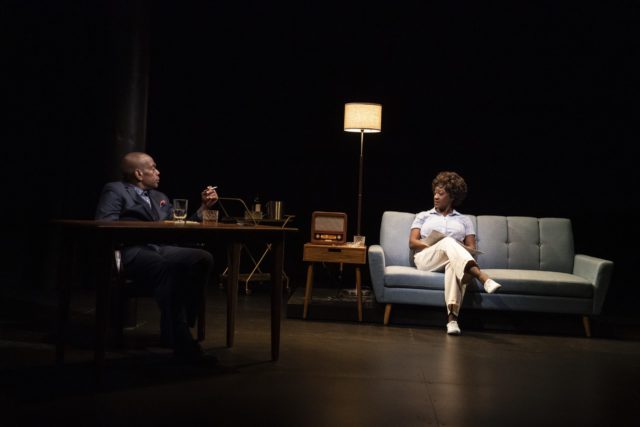
James Baldwin (Greig Sargeant) and William F. Buckley (Ben Jalosa Williams) face off about the American dream at the Public (photo by Joan Marcus)
BALDWIN AND BUCKLEY AT CAMBRIDGE
Anspacher Theater, the Public Theater
425 Lafayette St. at Astor Pl.
Tuesday through Sunday through October 23, $60-$70
212-539-8500
publictheater.org
During the pandemic lockdown, I watched the american vicarious’s virtual Debate: Baldwin vs Buckley, a sharp re-creation of the famous debate between liberal Black author James Baldwin and conservative white author William F. Buckley that was held at the University of Cambridge in England on February 18, 1965, addressing the question “Has the American Dream been achieved at the expense of the American Negro?” Presented in collaboration with BRIC, the show premiered in person at the Great Room at A.R.T./New York in March 2022 and continues its five-borough tour October 10 at the Old Stone House and November 11 at the Queens Theater. The online performances took place on a dark, spare stage with Baldwin (Teagle F. Bougere) and Buckley (Eric T. Miller) on either side of a small table; the in-person play moved the proceedings to a wood-paneled conference room with a black-and-white television occasionally showing clips of the original debate.
I also watched that original debate, which can be found on YouTube. It is a thrilling event, as mostly white male students in suits and ties pack the Cambridge Union; there’s barely room for the two main competitors to walk to their places at their opposing lecterns. The multiple cameras cut between the crowd and close-ups of Baldwin, in a narrow tie, and Buckley, in a bowtie, as they state their cases and react to each other’s points.
When I heard that Elevator Repair Service, one of the city’s most adventurous and daring companies for more than thirty years, was doing its own version, titled Baldwin and Buckley at Cambridge, at the Public’s Anspacher Theater, I was excited by the possibilities; ERS has previously staged unique interpretations of such classics as The Sound and the Fury, The Seagull, Ulysses, Measure for Measure, and The Great Gatsby (the eight-hour Gatz). Alas, perhaps I was expecting too much.

James Baldwin (Greig Sargeant) and Lorraine Hansberry (Daphne Gaines) have a drink while discussing racism in Baldwin and Buckley at Cambridge (photo by Joan Marcus)
Directed by ERS founding artistic director John Collins, Baldwin and Buckley at Cambridge turns out to be, more or less, a straightforward adaptation of the debate, with small little touches. The introductions by Cambridge students David Heycock (Gavin Price) and Jeremy Burford (Christopher-Rashee Stevenson) are delivered in contemporary dress (the costumes are by Jessica Jahn) and include a land acknowledgment and references to the Public, which opened on Lafayette St. in 1967. Heycock quotes Martin Luther King Jr. and shares frightening numbers about voting and prison that immediately bring to mind current attempts at voter suppression and the Black Lives Matter movement. Burford argues that “the American dream has been very important indeed in furthering civil rights and in furthering freedom for the American Negro,” a controversial statement, especially as delivered by Stevenson, who is Black. (Price is white.)
The bulk of the show are the two long monologues by Baldwin and Buckley, portrayed by Greig Sargeant and Ben Jalosa Williams, respectively; neither actor tries to fully embody their character, although Williams throws in a few lines doing a mock impression of the erudite Buckley’s upper-class accent. Although the words resonate with what is happening today, I wasn’t grabbed by the proceedings. Perhaps it was because I was too familiar with it all, having so recently seen the american vicarious version and the original. It also felt distant; the 1965 debate was filled to the gills with students, shoulder to shoulder in chairs and on the floor, while at the Anspacher we were sitting quietly in our seats, experiencing a fictionalized play, not actual history.
The play did not end with the conclusion of the debate; ERS adds a coda that initially stirred me but eventually left me confused. The brief scene takes place in a living room (the sets are by dots), where Baldwin is joined by his good friend, playwright Lorraine Hansberry (Daphne Gaines), as they discuss four hundred years of racism and the need for societal change. “We’ve got to sit down and rebuild this house,” Baldwin says. “The charge of impatience is simply unbearable,” Hansberry explains.
Mixing past and present, they then turn into Sargeant (who conceived the project) and Gaines, the actors, who recall working together at the Public in ERS’s The Sound and the Fury and discuss white and Black casting. While they make interesting points, reminding us how far we still have to go, it felt tacked on to score sociopolitical points; it also made me think about how Hansberry’s A Raisin in the Sun, which deals with a Black family in 1959 trying to find the American dream, is playing now in the Public’s Newman Theater.